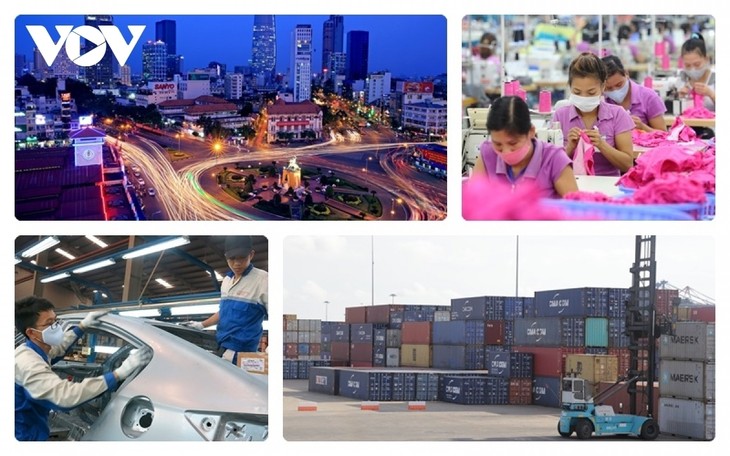(VOVWORLD) - Vietnam’s economy is recovering strongly from numerous challenges caused by the COVID-19 pandemic in the last two years. The recovery has been due to the promotion of independence and self-reliance since the Democratic Republic of Vietnam was founded on September 2, 1945.
 Independence, self-reliance are promoted in economic recovery and development Independence, self-reliance are promoted in economic recovery and development |
Since then, Vietnam’s economy has grown steadily thanks to fully tapping local resources and effectively utilizing external resources. FDI has become an important capital channel for Vietnam’s socio-economic development, contributing to economic restructuring toward industrialization and modernization. In 2019, before the COVID-19 pandemic occurred, there were 4,000 FDI investment projects with registered capital of 38.9 billion USD, 24 times higher than in 1990.
In 36 years of national renewal Vietnam has established strategic economic partnerships with other countries. Since joining the World Trade Organization in 2006, Vietnam has signed 15 free trade agreements which have created great opportunities for Vietnam to boost its economy and improve its competitiveness.
The COVID-19 pandemic disrupted the supply chain and production, and pushed back Vietnam’s economic growth to 3% while other countries reported negative growth. Vietnam succeeded in its dual goal of controlling the pandemic and developing the economy.
The Vietnamese Party and State have promoted the building of an independent, self-reliant economy, a rapid recovery, and sustainable development in “the new normal”. Vietnam believes national independence, self-reliance, and international integration can only be sustained by promoting internal strength.
The success of the Government’s socio-economic recovery and development policy has strengthened the confidence of businesses and the public. In the first half of this year, more than 76,000 new businesses were established, employing 515,000 workers. This increased the number of businesses 13.6% and the number of workers 6.3%. Total registered capital was 116 billion USD, up 30.3%. Approximately 117,000 businesses resumed operations.
Hoang Van Cuong, a National Assembly deputy, said: “Vietnam’s economy grew 2.58% in 2021 compared to 2020’s growth rate of 2.91%. Compared to 2019, before the pandemic, Vietnam’s economy grew 5.56%, while the world economy grew only 1.9%. This was an unexpected result."
He continued: "If we recall our situation in 2021, when the pandemic was extremely complicated, businesses had closed down, and workers had left economic hubs to return to their homes in rural areas. At that time nobody thought budget revenues would exceed the 2021 plan or that the growth rate would reach 5.7% in the first five months of this year. With current stability and steady recovery, Vietnam’s economy is forecast to grow 6.9% this year.”
Vietnam’s vibrant economy has drawn the attention of European businesses and Vietnam has become a prime destination for FDI. In February 2022, the Lego factory in Vietnam became the Lego group’s largest project ever. Meanwhile, a major partner of Apple has invested an additional 300 million USD in Vietnam.
Nguyen Ngoc Toan, Deputy Director of the Institute of Economics of the Ho Chi Minh National Academy of Politics, said: "At the 13th National Party Congress, the Party showed a determination to build an independent, self-reliant economy and strengthen international economic integration. To improve our economic strength, the Party aims to strengthen industrialization and modernization, build an independent, self-reliant economy, and make Vietnam an industrialized country. To develop rapidly, effectively, and sustainably, the Party stresses the need to bring into play internal strength, make use of external resources, and be proactive in international integration.”
By promoting a spirit of independence and self-reliance, Vietnam overcame numerous challenges 77 years ago to establish an independent state. That spirit continues today in the aspiration to build a more powerful Vietnam.